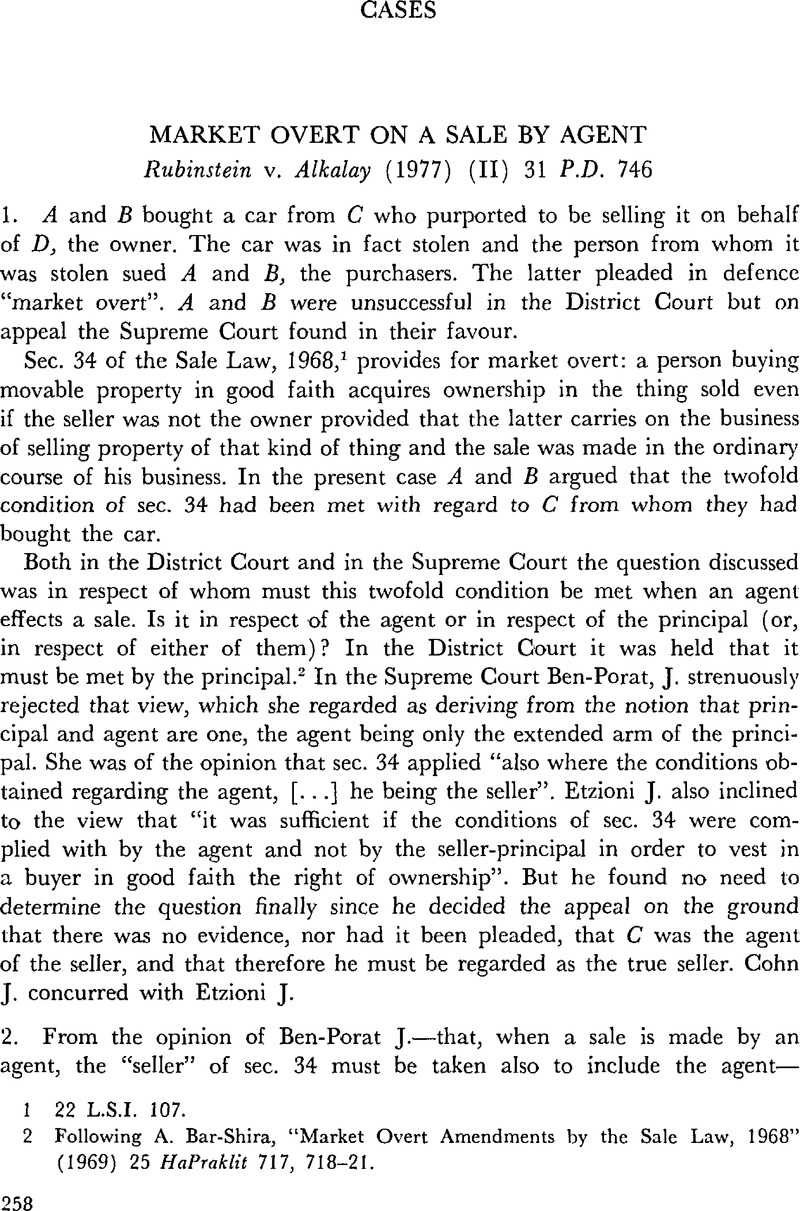No CrossRef data available.
Published online by Cambridge University Press: 12 February 2016

1 22 L.S.I. 107.
2 Following Bar-Shira, A., “Market Overt Amendments by the Sale Law, 1968” (1969) 25 HaPraklit 717, 718–21.Google Scholar
3 27 L.S.I. 117. The “distress” of sec. 18 is that of the principal since it does not affect the transaction but the situation of the interested principal. The same is true of “physical weakness” when it affects the principal's need of the thing sold.
4 Including the right of recission for defects in the agent's accord to the contract.
5 25 L.S.I. 11.
6 23 L.S.I. 283 at 298.
7 14 L.S.I. 60 at 75. As regards movable property which has been pledged, see Weisman, The Pledge Law, 1967 (Tedeschi, G. ed., Commentary on Laws relating to Contracts) (in Hebrew) 162.Google Scholar
8 Agency Law, 1965, sec. 3(b) (19 L.S.I. 231).
9 Sec. 7 provides: “If at the time of the act the third party did not know of the existence of the agency or did not know the identity of the principal, the act of the agent shall bind the principal and the agent jointly and severally, but shall entitle the agent only. However, the principal may assume any rights of the agent in respect of the third party save in so far as such is inconsistent with the right by reason of the nature or conditions thereof or by reason of the circumstances”.
10 According to Berinson J. in Rosenstreich v. Israel Automobile Co. (1973) (II) 27 P.D. 709, 712–13.
11 At 750.
12 Zeltner, Z., The Sale Law, 1968 (Commentary etc. ubi supra) 146.Google Scholar
13 [1949] 1 K.B. 322.
14 At 718.
15 Cf. Shereshevski J. in Auto Baiali etc. v. Lako Drive (1976) (II) 30 P.D. 207, 215, and Zeltner, op. cit., at 147.
16 At 753.
17 At 720.
18 (1959) 13 P.D. 768, 771.
19 At 749–51. This judgment was given before the Sale Law, and Witkon J. compared a middleman with the proprietor of a shop or his agent, under sec. 38 of the Civil Wrongs Ordinance, 1944.
20 See Gori, D., “Sale in Market Overt” (1972) 2 Iyunei Mishpat 92, 109.Google Scholar
21 See Land Law, 1969, sec. 16, and Movable Property Law, 1971, sec. 8 (25 L.S.I. 175).
22 Cf. Englard, I., “Twenty Five Years of the Civil Wrongs Ordinance: Trends and Problems” (1973/1974) 5 Mishpatim 572–73, 581–84, 596–97.Google Scholar